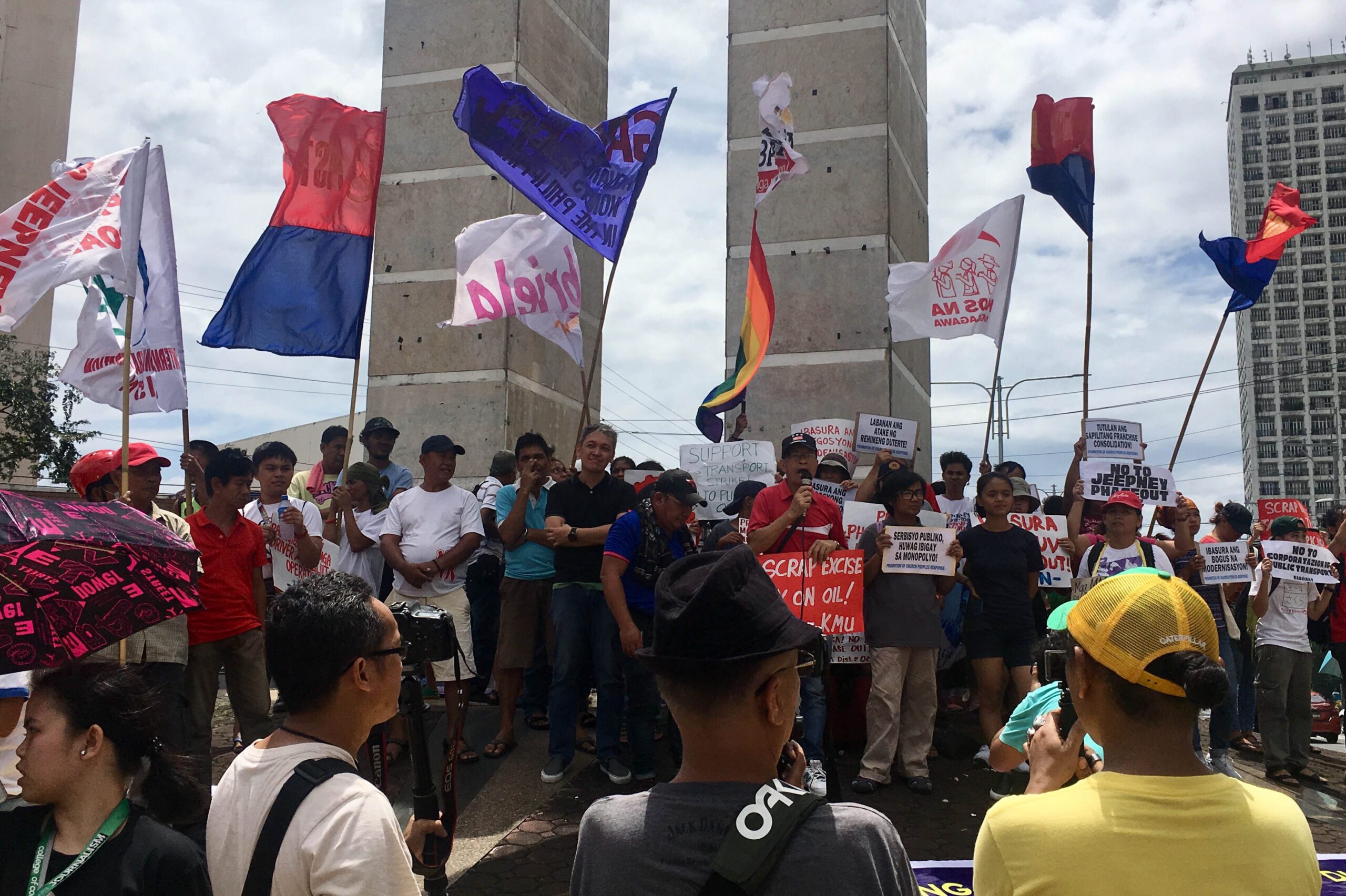SUMMARY
This is AI generated summarization, which may have errors. For context, always refer to the full article.

MANILA, Philippines – The Land Transportation Franchising and Regulatory Board (LTFRB) threatened to suspend or cancel the franchises of public utility vehicle (PUV) operators who joined the nationwide transport strike on Monday, September 30.
The LTFRB had earlier warned transport groups not to continue with the rally, reminding them of LTFRB Memorandum Circular No. 2011-004 which prohibits them from halting operations as a means of protest.
But since Monday’s nationwide transport strike pushed through, LTFRB Chairman Martin Delgra III said they will implement Transportation Secretary Tugade’s directive to hold those who joined accountable. Transport groups held the strike to protest against the PUV modernization program.
“We need to address the issue firmly, meaning ‘pag mapatunayan na lumahok nga, which is violative of that policy and the franchise that was given to them, either masuspendido or makansela ‘yung prangkisa nila,” he said.
(We need to address the issue firmly. If it is proven that they participated in the strike, which is violative of that policy and the franchise that was given to them, their franchises will either be suspended or canceled.)
Pinagkaisang Samahan ng mga Tsuper at Operator Nationwide (Piston) national president Mody Floranda said that threats like this are an old tactic and that even if they don’t hold a strike, they would still be forced to give up their franchises should the modernization program continue.
Piston and other transport groups held the transport strike to protest the PUV modernization program, which will phase out old jeepneys and replace them with Euro 4-compliant vehicles that may rely on renewable energy.
Delgra said that the penalties for participating in the transport strike may not only apply to operators, but to drivers as well. He said that the LTFRB may recommend the suspension or cancelation of the drivers’ licenses to the Land Transportation Office
When asked if the memo impedes on the operators’ freedom of assembly, consitutional law professor Tony La Viña agreed that LTFRB Memorandum Circular No. 2011-004 is unconstitutional. Section 4 of the Bill of Rights stipulates that no law shall be passed abridging the right of people to peaceably “assemble and petition the government for redress of grievances.”
“If it means you have to stop the service, then that’s the case,” La Viña told Rappler.
He added that suspension or cancelation of franchises cannot be done just because an operator participated in a political strike. However, it can be done if violence occurs.
As for those whose franchises were already canceled for participating in a 2017 transport strike, La Viña said they should file a case. “It’s a violation of their constitutional right,” he said.
Success?
Piston declared Monday’s nationwide transport strike a success, claiming that the National Capital Region and other locations across the country were paralyzed by the lack of available transportation.
Floranda reported the following participation rates for multiple cities and regions, as relayed by the group’s members across the country:
- Rizal – 70%
- Monumento – 90%
- Alabang – 90%
- Vista Mall, Taguig – 100%
- Navotas – 90%
- Iloilo – 100%
- Davao – 80%
- Southern Tagalog – 95%
- Angeles, Pampanga – 100%
- Batangas – 70%
- Panay – 95%
The Philippine National Police National Operations Center reported an estimated total of 1,259 protesters nationwide.
In response to the claim that Metro Manila was 95% paralyzed by the strike, Delgra said there have also been reports of aggressive protesters who blocked and threw rocks at PUVs that did not participate in the strike.
The LTFRB chairman said he did not want to gauge the success of the strike through numbers, because the meaning of the numbers may be blurred by incidents like these.
The transport groups, meanwhile, reiterated that they are not against modernization but the way it is being implemented. Instead of modernizing PUVs, the groups called for rehabilitation, which would only cost them around P500,000 instead of the P1.6 million required by the modernization program.
“Matagal na pong nagre-rehab, 73 years na nagre-rehabilitation ang mga operator at napatunayan po natin ‘yun na hanggang sa ngayon ay tuloy-tuloy na nagseserbisyo sa mamamayan,” Floranda said.
(Operators have been rehabilitating PUVs for 73 years, which proves that this method allows vehicles to continue serving the public.)
Despite the transport strike, Delgra said they will continue the implementation of the PUV modernization program.
“It may be a little bit slow if there are some challenges that we need to face or it might be a little fast,” Delgra said.
He said the regulatory body will still engage in dialogues, consultations, and workshops with all transport groups – even those who are apprehensive of or those who oppose the modernization program.
“We engage all public transport, even those who are opposed to the modernization. Iba lang ‘yung pagtingin nila kung paano gagawin. Diyalogo at consultation ang kailangan. Hindi option ang transport strike lalong-lalo na kung pineperwisyo mo ‘yung mga mananakay,” Delgra said.
(They have different views regarding how it should be implemented. Thus, we need dialogues and consultations. Transport strikes are not an option, especially when they affect commuters.)
However, Floranda said that when they tried to engage in dialogue with Delgra, the chairman maintained his position that individual operators will be “washed out.”
Floranda said that Senator Grace Poe wanted to discuss another modernization plan with them, one that they are more agreeable to. Senate Bill No. 867 or the Just and Humane Public Utility Vehicles Modernization Act aims to test the roadworthiness of PUVs and require them only to replace their engines. – Rappler.com
Add a comment
How does this make you feel?
There are no comments yet. Add your comment to start the conversation.